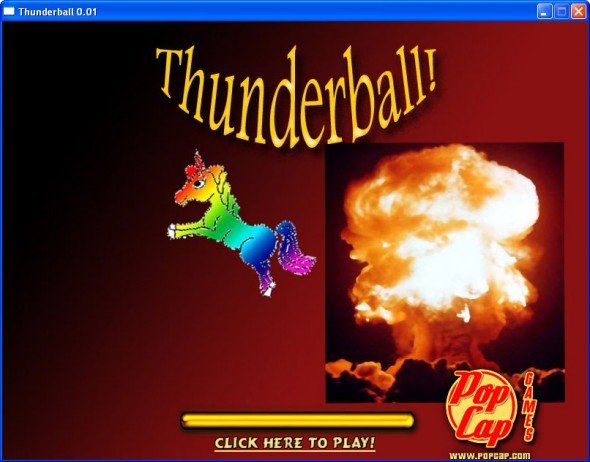The Making of Peggle

PopCap Games are the creators of Bejeweled, Peggle and Plants vs. Zombies, each of them one of the biggest and most lovable games on PC. When casual and social games are reaching ever larger audiences and their developers are getting a bad reputation for poor design practices, how have PopCap managed to find fans amongst gamers and grannies alike? To find out, I visited the studio and interviewed everyone I could find. We're running those interviews each day this week and calling it PopCap Week .
Today I'm speaking to PopCap co-founder Jason Kapalka and the designer of Peggle, Sukhbir Sidhub. It's only now when looking back at the transcript that I realise there are long periods when I don't ask any questions. Jason and Sukhbir have worked together for years, and it shows. They talk away without my intervention, revealing details of PopCap's forgotten first release, a strip poker game called Foxy Poker, and follow it up by going into detail about the many variants of Peggle, including a Thor-themed version called Thunderball, and what would have happened if co-founder John Vechey's mum had been PopCap's accountant.

Jason Kapalka: You know the original name, right?
PC Gamer: I think it was Sexy Action Cool?
Jason Kapalka: Yeah. I don't know if you know the original product. Did they show you Foxy Poker?
PC Gamer: No.
Jason Kapalka: That's the PR person having a pained look on their face
The biggest gaming news, reviews and hardware deals
Keep up to date with the most important stories and the best deals, as picked by the PC Gamer team.
(laughter)
Jason Kapalka: This is not in our corporate histories, but the first thing that we did was a strip poker game. Mostly just because we thought, “We can do this thing, then we can sell it and take the money to use to do whatever.”
It was more like strip video poker and in fact there wasn't actually any stripping. We were still trying to do this advertising stuff where they wouldn't allow nudity, so there was this awesome power stripping where there was always some object interposed. We did get a lot of complaints, because you had to play a long time to get enough tokens to get to the final stage of undress, and when you did there was some vases and things, so we got a lot of complaints that they'd just spent four hours.
It was a pretty good strip poker game if I do say so myself, but we found there was going to be a hard time doing anything with it because we didn't really have the heart to deal with any of the porn companies because they were just too scummy. We abandoned our short lived effort to be a company like that. We then did Bejeweled and after that, yeah, started licensing games to Microsoft, primarily, and a few other companies.
PC Gamer: Did you have in your heads the type of game that you wanted to make at that point?
Jason Kapalka: The strip poker game seemed like a way to get some starting money, but the kind of games we were planning on doing were always these web-based, simple puzzle games.
We ended up gravitating more to single player puzzle games, not necessarily because of choice, but because it was easier to sell, because the multiplayer stuff was a real pain in the butt to integrate. If you want to go to Microsoft with a multiplayer game it was really hard, because you had to work with their APIs.
We did actually do multiplayer games for the first couple of years at PopCap. Psychobabble is the coolest one, probably. A sort of competitive fridge magnet poetry. It was really fun and actually very funny, it was a laugh out loud hilarious often. We eventually took it down a few years back, not because it wasn't any good but because it was literally impossible to make it family friendly. No matter how many curse words or suggestive words you took out, people would find a way to make something filthy out of any possible configuration of words.
Sukhbir Sidhub: That was definitely half the fun of the game.

PC Gamer: At what point did you join the company?
Sukhbir Sidhub: I think it was June 2002. It was about a year or two after Bejeweled.
Jason Kapalka: Yeah, 2002, I guess. At that point I can't remember what employee number you were.
Sukhbir Sidhub: I think there were like seven other people, but I'm not quite sure. Pretty small office.
PC Gamer: I read your bio and you were number 8 I think.
Jason Kapalka: Sounds right. I mean, some of them were like John's mum was our accountant.
Sukhbir Sidhub: His aunt.
Jason Kapalka: Oh no, his Aunt. Sorry, that would be terrible!
Sukhbir Sidhub: (laughs) Yeah. I don't think we would be here now if John's mom was our accountant back then.
Jason Kapalka: Yeah, I think we'd all be in jail.
PC Gamer: Can you talk me through a little bit the development process for making Peggle?
Sukhbir Sidhub: The first conversation I had with Jason when I talked about coming up here to work for PopCap, we talked about the kinds of games they wanted to make. You know, casual games, games for a wide audience. I actually mentioned Pachinko at that time and we started talking about it just in that one conversation.
That was years before we even started Peggle, because I'd actually played a Pachinko game that Jason had at his apartment back in San Francisco. It was a Godzilla Pachinko machine, and it was awesome. It was really fun and it was mesmerising and I couldn't believe how fun it was and how addictive it was.
So that experience always stayed with me, but the problem with that was, it was all luck. It's hard to make a computer game, because the fun in Pachinko, in regular Pachinko, is the gambling aspect of it. Even though it's mesmerising, it's going to be hard to get that same feeling in a game. That was a problem
And then a few years later, one of our developers had been working on a simple 2D physics engine, and we started talking about the idea of a Pachinko or a pinball game, but we didn't really know what to do. We wanted to do some sort of Pachinko game and we needed some skills, so we were thinking maybe if it was somehow meshed with pinball.
We ended up spending about 3 or 4 months prototyping different game ideas. Some where very Pachinko like, some were very pinball like, some were in between, some were Breakout. We were trying to find something that was fun, accessible, simple, so we went all over the map for a few months.
PC Gamer: So over that three or four months, when did you start to know that you were hitting the right balance between Pachinko and pinball or, what was the breakthrough?

